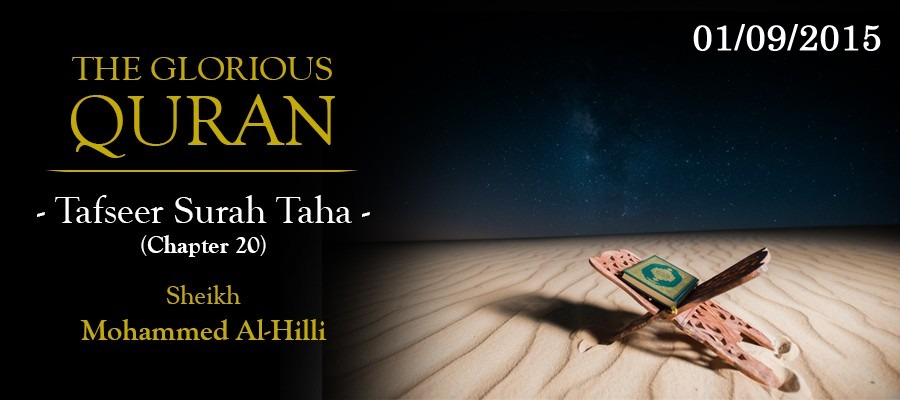
Shaykh Mohammed al-Hilli continues his weekly tafsīr of Sūrat Ṭā Hā.
Shaykh Mohammed began by noting how it is a common feature amongst all humans to have the desire to question. As human beings we use questions to obtain information, but also as a way of presenting information and pursuing arguments. We’re used to the exchange of questions and, when a question is put to us, our first instinct is to simply answer it. In Islam asking questions can be a noble endeavour when it is done in order to seek knowledge, but not when questions are used in order to undermine someone. In a famous hadith we are told that Prophet Muhammed (s) said: “Knowledge is a treasure and the key is the question, so ask, God bless you” (Biḥār al-‘Anwār, vol. 1, p. 196). We are told that there are four people who will be rewarded by God in the scenario of a question and answer exchange: the one who asks the question, the one who answers, the one who listens to the exchange and the one who likes this process taking place. The importance Islam places on asking questions in order to attain knowledge and understanding cannot be stressed enough. However, we have to also be aware that there are certain etiquettes when it comes to asking questions. We need to understand the purpose of asking question, rather than simply asking for the sake of it. Once, for example, Prophet Muhammed was answering question on a variety of important subjects, such as jurisprudence and ethics, when someone stood up and asked: “Is my father or mother in Hell?” It was then the following verse from the Qur’an was revealed: “yā ‘ayyuha allaδīna ‘āmanū lā tas’alū `an ‘ašya’a ‘in tubdalakum tasu’kum – Oh you who believe, don’t ask about things that, if shown to you, will distress you” (5:101). Asking questions is good, but not when the answer will not benefit you in anyway.
Just as there is a certain etiquette when it comes to asking questions, there is also an etiquette for answering them. In Sūrat Ṭā Hā we see Pharaoh subjecting Moses to a number of questions. In flagrant contempt of all etiquette, not using these questions to attain knowledge, but only as an attempt to undermine Moses’s message. However, Moses uses this opportunity to give Pharaoh guidance, whether he wants it or not. Many times when people ask us questions we simply answer, without really going into the issue in more depth. Sometime we don’t even answer the question. I’m sure many of us will remember the infamous interview of 1997 between Jeremy Paxman and Michael Howard, in which Paxman asked if Howard had threatened to overrule Derek Lewis a total of twelve times, and each time Howard evaded the question. Conversely, the Qur’an encourages us to use the opportunity of being asked a question to give the questioners more.
We can take as an example the story of Joseph. We are told in Sūrat Yūsuf that when he was imprisoned by the King of Egypt there were two others who were imprisoned with him. One had a dream in which he was pressing wine and the other had a dream in which he had bread on his head, and the birds were eating from it, and both asked Joseph to interpret the dreams for them, selecting him because he was “min al-muḥsinīn – from those who do good” (12:36). Joseph assures them that he will give them the answer to their question before food arrives for them, but before answering he takes the opportunity to preach to them about God. He tells them that his ability to interpret dreams is given to him by God, and that he follows the creed of Abraham, in which nothing is partnered with God. He asks them about their polytheism, asking them: “‘a’arbābun mutafarriqūna xayrun ‘am allāhu al-wāḥidu al-qahhār – are fragmented lords better than one, overwhelming God?” (12:39). He tells them that they should not worship anything other than God and then, having provided them with guidance, tells them the meanings of their dreams: that one will be released and serve wine to his master, whilst the other will be crucified and the birds will eat from his head.
Just as Joseph took the opportunity of having fairly simple questions put to him to preach about monotheism, Moses takes the opportunity of Pharaoh asking him questions to talk about God’s blessings. We saw last week how Moses responded to Pharaoh’s two questions: “faman rabbukumā yā mūsā – so who is your Lord, oh Moses?” (20:49) and “famā bālu al-qurūni al-‘ūlā – so what of the former generations?” (20:51). Having answered the questions directly, Moses expands on his answers in order to talk about God’s creation. However, the voice shifts with the Qur’anic narrative. Though the following verses represent Moses’s conversation with Pharaoh, the voice used is the standard Qur’anic voice which refers to God in the third and first persons. The forms of address also shift from singular to plural, so all mankind is invoked, not just Pharaoh. The 53rd verse reads: “allaδī ja`ala lakum al-‘arḍa mahdan wasalaka lakum fīhā subulan wa’anzala min al-samā’i mā’an fa’axrajnā bihi ‘azwajan min nabātin šattā – He is the one who made for you the earth as a cradle, and inserted roads in it for you, and sent down water from the sky, and thereby we brought out in pairs all kinds of plants” (20:53). Let’s look at this verse in more detail.
First of all we are told that: “allaδī ja`ala lakum al-‘arḍa mahdā – He is the one made for you the earth as a cradle”. The word used here, “mahd”, literally means “cradle”, but we can of course understand it in a more figurative sense. The cradle is a place in which a baby is kept in peace and safety, being cared for as it begins to develop into an adult human being. As such, we can interpret these words in the sense that the earth has been created for us so that we may live safely and develop. Following this we have: “wasalaka lakum fīhā subulā – and inserted roads in it for you”. The interpretation of this is that the ability to build roads, which is connected to the development of human civilisation, is part of the intelligence that God has granted mankind. There is, however, another interpretation, in which the word “subul” is not understood to literally mean “roads”, but rather “ways” or “means”. The singular form “sabīl” is used throughout the Qur’an manifestly in this more figurative sense. As such, it may mean that God has provided us with ways to survive and to live by in this earth. Then we are told: “wa’anzala min al-samā’i mā’ – and sent down water from the sky”. We should pause here to think for a moment about how often water is mentioned in the Qur’an. In Sūrat al-‘Anbiyā’ God tells us: “waja`alnā min al-mā’i kulla šay’in ḥayy – and we made from water every living thing” (21:30). Thanks to modern science we know for a fact that water is a prerequisite for life to develop, so much so that in the search for extraterrestrial life one of the first things the scientists look for are planets that have water, thereby vindicating what we are told in the Qur’an. Similarly, in Sūrat al-Furqān we are told that: “huwa allaδī xalaqa min al-mā’i bašarā – He is the one who created man out of water” (25:54). The Qur’an fully acknowledges the necessity of water, not just for the sustaining of life, but also for the creation of life itself. It should come as no surprise then that, continuing on with the fifty-third verse of Sūrat Ṭā Hā, straight after the reference to water we are told: “fa’axrajnā bihi ‘azwājan min nabātin šattā – and thereby we brought out in pairs all kinds of plants”. Here again we have confirmation of water forming the origin of life. But it would be useful to take a moment now to reflect on the idea of pairs invoked in this verse.
The idea of things coming in pairs is a common theme throughout the Qur’an. In Sūrat al-Đāriyyāt, for example, God tells us: “wamin kulli šay’in xalaqnā zawjayni la`allakum taδakkarūn – and from all things we created pairs so that you might remember” (51:49). Also, in Sūrat Yā Sīn we are told: “subḥāna allaδī xalaqa al-azwāja kullahā mimmā tunbitu al-‘arḍu wamin ‘anfusihim wamimmā lā ya`malūn – praise be to He who created all the pairs from that which the earth grows, and from themselves, and from that which they don’t know” (36:36). Living things are constantly being referred to as being created in pairs, whether plants or animals, and we might consider in relation to this the double-helical structure of DNA and dualistic (and generative) nature of gender. But what of “that which they don’t know”? We now know that there is a fundamental duality in the nature of the universe, in the form of the opposition of matter and antimatter. Every elementary particle has its corresponding antiparticle, which is identical but opposite to it, and whenever a particle comes into being, its antiparticle is created right alongside it. On a very basic level, everything is created in pairs, right down to the fundamental substance of the universe that, until very recently, we’ve not been aware of.
The next verse of Sūrat Ṭā Hā tells us: “kulū war`aw ‘an`āmakum ‘inna fī δālika la’āyātin li’uli al-nuhā – eat and feed your livestock, in that are signs for those with intelligence” (20:54). Let us take a moment to see where we have come. Over the past two verse we began with the earth, moved on to water, from there to plants, which took us to animals and ourselves (i.e. humans), with a dependent relationship developing across this progression. What we see here is the development of life of earth. It begins with the earth itself, described as a cradle, that is to say a place which houses the development of something. Then we have water on the earth, which allows for the development of plants. The existence of plants then allows for the rise of animals, providing them with a food source that they might be sustained. Finally human beings come onto the scene, since we are commanded to eat and feed our livestock, both plants and animals constituting a form of sustenance for us. This is truly a sign from God for those who have intelligence, those who study the world and witness for themselves the truth that is written in the Qur’an. However, the actual phrase used “uli al-nuhā” has a deeper meaning than “those with intelligence”.
Though the word “nuhā” does indeed mean “intelligence” or “understanding”, it’s different from words like “`ilm – knowledge” or “`aql – intellect”. Though the latter two come from roots that contain the meanings of knowing and understanding, the word “nuhā” comes from the root N-H-W, which has the meaning of ending, stopping and limits. As such, “nuhā” means intelligence in the particular sense of knowing where to stop, where to draw the line. Therefore, “‘ulu al-nuhā” are those who use their intelligence to govern their actions, rather than their passions. There is a hadith from Prophet Muhammed (s) in which he enumerates the characteristics of these people. He was asked: “Who are ‘ulu al-nuhā?” and he replied: “They are those who have good characters, serious aspirations, the bond of familial relationships, devotion to their mothers and fathers, who have pledged themselves to their neighbours and to orphans, who distribute food and spread peace in the world, and pray whilst neglectful people are sleeping.” (Al-Kafi, vol. 2, p. 240). These are the qualities which define ‘ulu al-nuhā, qualities which we should all aspire to emulate.
Following this concise allusion to the development of life on earth God tells us: “waminhā xalaqnākum wafīhā nu`īdukum waminhā nuxrijukum tāratan ‘uxrā – and We have created you from it, and We’ll return you to it, and We’ll take you out from it another time” (20:55). The first question we can ask is, what does it mean for us to be created from the earth? Some exegetes have interpreted this very literally, saying that Adam was created from clay, and as we are all decedents of Adam we all have our origin in the earth. Others have said no, what is meant when God tells us He has created us from the earth is that all of our sustenance comes from the earth, thus allowing us to exist. This latter interpretation correlates with how, a couple of verses earlier, we identified the earth as being the beginning of a progression that ends with the continued existence of human life. As such, we can interpret this verse as saying that the earth is the place of our origin, rather than the substance of it. Moreover, this verse as a whole is a great way to confront those who are arrogant.
No matter how grand you think you are, in the end of the day you come from the soil, and you’ll inevitably return there. No matter how much wealth you accrue, you’re not really any different in substance from anyone else – all come from the earth, will die and will be resurrected to testify for their actions in life. Look, for example, at King Abdullah of Saudi Arabia. When he was alive Forbes magazine estimated his personal wealth at about $21 billion. Now his body decays in the earth. In Sūrat al-Humazah God tells us: “allaδī jama`a mālan wa`addadah | yaḥsabu ‘anna mālahu ‘axladah | kallā layunbaδanna fi al-ḥuṭamah – the one who accrues wealth and counts it | thinks that his wealth will immortalise him. | Certainly not! He will be thrown down in pieces” (104:2-4). In the end of the day we’re all mortal, and the accumulation of wealth can do nothing to change that. Finally, we can end on a story about Imam Muhammed al-Jawad (a). As we know, Imam al-Jawad was still a child when his father was killed and he became the Imam. One day he was with some other children as they were playing around with some soil in the street. All of a sudden the caliph of time, Ma’mun, came down the street, accompanied by his sizable entourage. All the children ran away at the sight of him, apart from Imam al-Jawad who remained where he was. Ma’mun approached him and asked: “Aren’t you afraid of my presence like the other children are?” Imam al-Jawad pointed to the soil that the children had been playing with and quoted the verse we’ve just been looking at: “minhā xalaqnākum wafīhā nu`īdukum waminhā nuxrijukum tāratan ‘uxrā – We have created you from it, and We’ll return you to it, and We’ll take you out from it another time”. He reminded him that, despite all the pomp and ceremony of Ma’mun’s entourage, he was just another human being. There is no caliph or king or global potentate who can escape the earth from which he has come and to which he will one day inevitably return. None of us, then, have anything to be arrogant about.
Next week, insha’allah, we will carry on with our tafsīr, continuing to look at the story of Moses and Pharaoh in Sūrat Ṭā Hā.


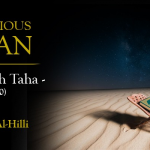
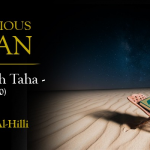
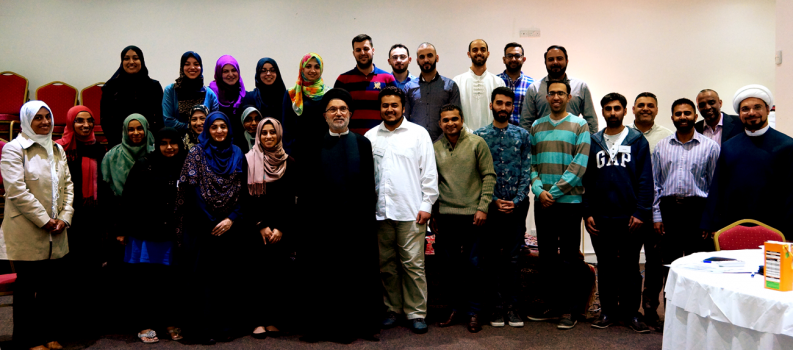
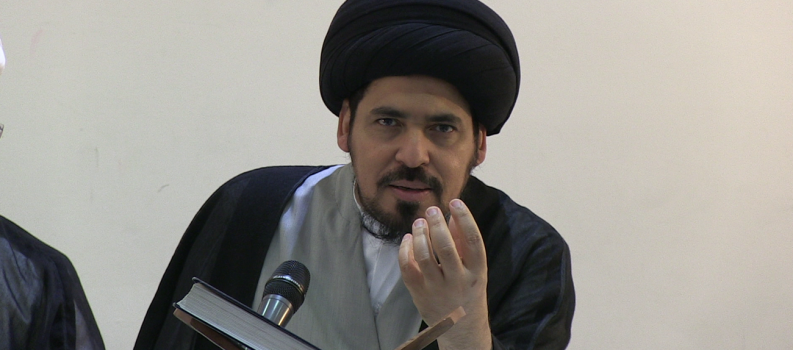

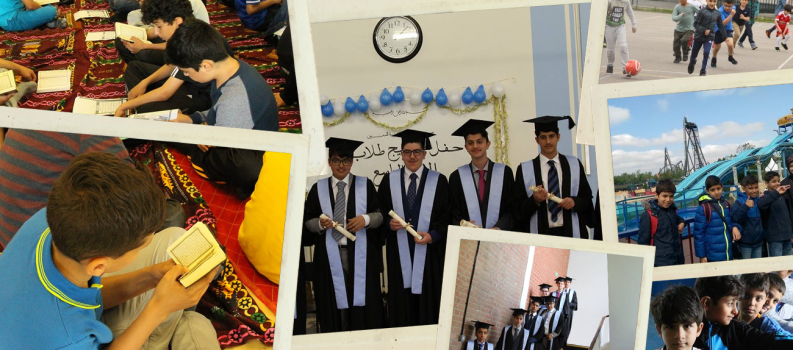

Slms pls include me in your tafseer mailing list.
Wassalam, you have been added to the mailing list.